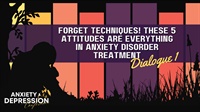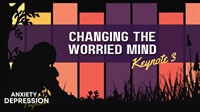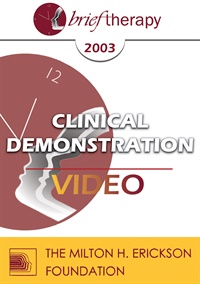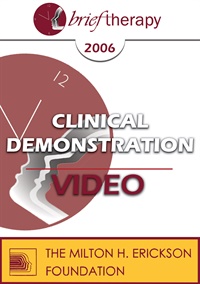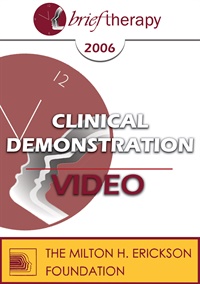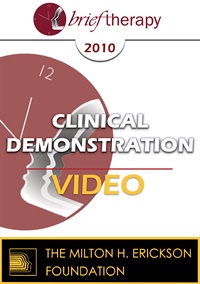- Average Rating:
- Not yet rated
- Topic Areas:
- Dialogues | Anxiety | Strategic Therapy
- Categories:
- Anxiety and Depression Conference 2024
- Faculty:
- Reid Wilson, PhD | Lynn Lyons, LICSW
- Course Levels:
- Master Degree or Higher in Health-Related Field
- Duration:
- 1:00:51
- Format:
- Audio and Video
- Original Program Date:
- Sep 15, 2024
- Short Description:
- This session emphasizes attitude over technique in treating anxiety. Reid Wilson and Lynn Lyons advocate treating anxiety as a mental game, encouraging clients to personify the disorder and focus on emotional patterns rather than specific fears. Core attitudes—like courage, defiance, and tenacity—are key to stepping into discomfort. Strategies include using metaphors, reframing health anxiety as OCD, and distinguishing real problems (signals) from mental noise.
- Price:
- $59.00 - Base Price
- Average Rating:
- Not yet rated
- Topic Areas:
- Keynotes | Anxiety | Cognitive Behavior Therapy (CBT)
- Categories:
- Anxiety and Depression Conference 2024
- Faculty:
- Reid Wilson, PhD
- Course Levels:
- Master Degree or Higher in Health-Related Field
- Duration:
- 1:00:51
- Format:
- Audio and Video
- Original Program Date:
- Sep 15, 2024
- Short Description:
- This session focuses on treating generalized anxiety disorder through a unifying framework for anxiety disorders. Key concepts include distinguishing “signal” from “noise” worries and breaking the cycle where worry suppresses physical activation. Emphasis is placed on shifting mindset, accepting uncertainty, and using proactive behavioral strategies to reduce anxiety’s hold and build long-term resilience.
- Price:
- $59.00 - Base Price
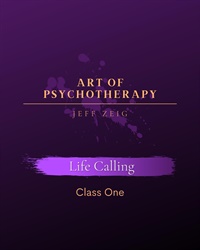
- Average Rating:
- Not yet rated
- Topic Areas:
- Utilization | Clinical Demonstrations | Psychotherapy | Therapist Development | Anxiety | Ericksonian Hypnosis and Therapy Techniques | Religion | Art of Psychotherapy
- Bundle(s):
- Art of Psychotherapy - Utilization Series
- Categories:
- Art of Psychotherapy
- Faculty:
- Jeffrey Zeig, PhD
- Course Levels:
- Master Degree or Higher in Health-Related Field
- Duration:
- 2 Hours 22 Minutes
- Format:
- Audio and Video
- Original Program Date:
- Jun 21, 2020
- Short Description:
- In our first session, our demonstration subject has recently made a major life change. They have decided to change their career from being a priest, into becoming a therapist. Big life changes like these often induce anxiety in patients, and in this clinical demonstration we see Dr. Jeffrey Zeig exhibit a number of Ericksonian techniques to help the client be in harmony with themselves. Dr. Zeig utilizes some of Ginny’s religious history to help guide her towards transformation.
- Price:
- $79.00 - Base Price
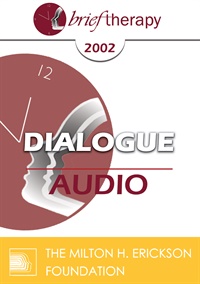
- Average Rating:
- Not yet rated
- Topic Areas:
- Dialogues | Depression | Brief Therapy | Anxiety
- Categories:
- Brief Therapy Conference | Brief Therapy Conference 2002
- Faculty:
- Reid Wilson, PhD | Michael Yapko, PhD
- Duration:
- 55:12
- Format:
- Audio Only
- Original Program Date:
- Dec 13, 2002
- Short Description:
- This dialogue explores the intersection of anxiety and depression, emphasizing the need to assess and treat both conditions together. Key topics include simple screening tools recommended by the Agency for Healthcare Quality and Research, rising depression rates, and the role of psychoeducation and hypnosis in treatment. A case study highlights how addressing depression can lead to meaningful improvements in anxiety symptoms.
- Price:
- $15.00 - Base Price

- Average Rating:
- Not yet rated
- Topic Areas:
- Workshops | Anxiety | Depression | Happiness | Love | Relationships | Brief Therapy
- Categories:
- Brief Therapy Conference | Brief Therapy Conference 2002
- Faculty:
- Pat Love, EdD
- Duration:
- 1:40:50
- Format:
- Audio Only
- Original Program Date:
- Dec 15, 2002
- Short Description:
- To love and be loved. Sounds simple - yet for many it is one of life's most difficult challenges. Come and explore three major causes of unhappiness in relationships and gain a deeper understanding of how they are related.
- Price:
- $15.00 - Base Price
- Average Rating:
- Not yet rated
- Topic Areas:
- Clinical Demonstrations | Panic | Brief Therapy | Strategic Therapy | Anxiety
- Categories:
- Brief Therapy Conference | Brief Therapy Conference 2003
- Faculty:
- Reid Wilson, PhD
- Course Levels:
- Master Degree or Higher in Health-Related Field
- Duration:
- 1:00:14
- Format:
- Audio and Video
- Original Program Date:
- Dec 12, 2003
- Short Description:
- In this clinical demonstration, a client struggling with escalator and highway driving fears learns to confront anxiety through structured exposure. Emphasizing frequency, duration, and intensity, the session outlines 45-minute practice sessions to build habituation. Anxiety is reframed as a training opportunity, and a point system is introduced to boost motivation and help the client face fears with purpose and persistence.
- Price:
-
Sale is $29.00
price reduced from Base Price - $59.00
- Average Rating:
- Not yet rated
- Topic Areas:
- Clinical Demonstrations | Obsessive Compulsive Disorder (OCD) | Brief Therapy | Strategic Therapy | Anxiety
- Categories:
- Brief Therapy Conference | Brief Therapy Conference 2006
- Faculty:
- Reid Wilson, PhD
- Course Levels:
- Master Degree or Higher in Health-Related Field
- Duration:
- 56:55
- Format:
- Audio and Video
- Original Program Date:
- Dec 08, 2006
- Short Description:
- In this clinical demonstration, a client with lifelong OCD and perfectionism explores strategies for managing intrusive thoughts and compulsions. Emphasis is placed on accepting obsessions, embracing uncertainty, and practicing intentional “mistakes” to challenge perfectionistic rituals. Techniques include journaling, cognitive reframing, and frequent, prolonged exposure to feared thoughts. The session concludes with targeted homework to reinforce these skills and support long-term change.
- Price:
-
Sale is $29.00
price reduced from Base Price - $59.00
- Average Rating:
- Not yet rated
- Topic Areas:
- Clinical Demonstrations | Hypnosis | Anxiety | Depression
- Categories:
- Brief Therapy Conference | Brief Therapy Conference 2006
- Faculty:
- Michael Yapko, PhD
- Course Levels:
- Master Degree or Higher in Health-Related Field
- Duration:
- 1:01:08
- Format:
- Audio and Video
- Original Program Date:
- Dec 08, 2006
- Short Description:
- This session shows how hypnosis creates a multidimensional space for problem-solving by amplifying awareness, uncovering blind spots, and fostering new connections. Yapko demonstrates how trance supports clients in moving beyond self-doubt and rigid definitions toward resilience, forgiveness, and self-trust. Participants learn how hypnosis offers a context for integrating cognition, emotion, and spirit into lasting growth.
- Price:
-
Sale is $29.00
price reduced from Base Price - $59.00
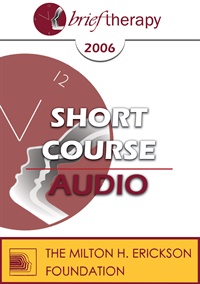
- Average Rating:
- Not yet rated
- Topic Areas:
- Short Courses | Brief Therapy | Solution Oriented Approach | Strategic Therapy | Anxiety | Future Oriented
- Categories:
- Brief Therapy Conference | Brief Therapy Conference 2006
- Faculty:
- Joseph Dowling, MS, LPC
- Duration:
- 1:19:30
- Format:
- Audio Only
- Original Program Date:
- Dec 07, 2006
- Short Description:
- This short course will describe a brief strategic/solution-focused and hypnotic approach to anxiety related disorders. Participants will learn to creatively engage their obsessive thinking, perfectionist, Whying and What Ifing clients via live demonstration, experiential exercise and case studies. The art of What Willing will be introduced conversationally, experientially and energetically. This course will demonstrate how a client can be transported back and forth in time and space, accessing her unique history of success and future memories of her best self.
- Price:
- $15.00 - Base Price
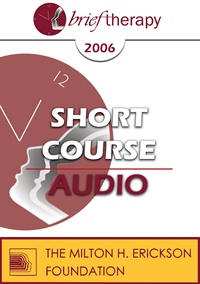
- Average Rating:
- Not yet rated
- Topic Areas:
- Short Courses | Anger | Anxiety | Brief Therapy | Communication
- Categories:
- Brief Therapy Conference | Brief Therapy Conference 2006
- Faculty:
- Kevin Humphrey, MA | Allan Sargent | Marilyn Sargent
- Duration:
- 1:15:09
- Format:
- Audio Only
- Original Program Date:
- Dec 07, 2006
- Short Description:
- Does your client have anyone in their life that can "get them," so that they feel like running away or punching the person out? What if you had the hemispheric integration tool that can change their initial response to that person or even to a situation? When clients remain centered, they will influence and set boundaries that will actually change the dynamics of the relationship. When your client is different the interactions have to evolve.
- Price:
- $15.00 - Base Price
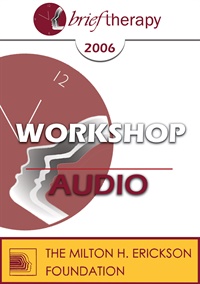
- Average Rating:
- Not yet rated
- Topic Areas:
- Workshops | Anxiety | Obsessive Compulsive Disorder (OCD) | Strategic Therapy
- Categories:
- Brief Therapy Conference | Brief Therapy Conference 2006
- Faculty:
- Reid Wilson, PhD
- Duration:
- 2:37:51
- Format:
- Audio Only
- Original Program Date:
- Dec 07, 2006
- Short Description:
- This workshop presents a strategic approach to anxiety that shifts focus from calming down to stepping up. Clients are encouraged to reframe their relationship with anxiety, treat symptoms as opportunities, and seek out discomfort to build resilience. Key techniques include cognitive restructuring, exposure, and distinguishing between signal and noise in worries. Rather than avoiding fear, clients learn to play the "anxiety disorders game"—changing mindset, embracing uncertainty, and expanding their options for handling distress.
- Price:
- $15.00 - Base Price
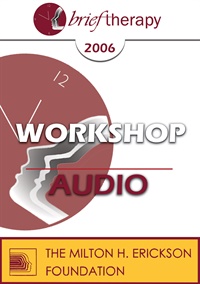
- Average Rating:
- Not yet rated
- Topic Areas:
- Workshops | Obsessive Compulsive Disorder (OCD) | Brief Therapy | Homework | Anxiety
- Categories:
- Brief Therapy Conference | Brief Therapy Conference 2006
- Faculty:
- Reid Wilson, PhD
- Duration:
- 2:37:56
- Format:
- Audio Only
- Original Program Date:
- Dec 09, 2006
- Short Description:
- This session offers a practical, structured approach to treating OCD through exposure and response prevention. Key assignments include daily worry time, postponing obsessions, loop tapes, and scripted worst-case scenarios to desensitize anxiety. Techniques for modifying rituals—like slowing them down or adding consequences—help disrupt compulsive patterns. The discussion also covers OCD subtypes, working with children using rewards and play, and integrating medication when appropriate. Emphasis is placed on accepting obsessions, avoiding reassurance, and tailoring interventions to each client.
- Price:
- $15.00 - Base Price
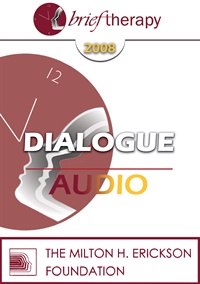
- Average Rating:
- Not yet rated
- Topic Areas:
- Dialogues | Anxiety | Depression | Group Therapy
- Categories:
- Brief Therapy Conference | Brief Therapy Conference 2008
- Faculty:
- Erving Polster, PhD | Michael Yapko, PhD
- Duration:
- 58:43
- Format:
- Audio Only
- Original Program Date:
- Dec 13, 2008
- Short Description:
- This dialogue explores depression as a disorder of perspective, shaped more by coping style and social context than by biology alone. Emphasizing the dangers of rumination, passivity, and isolation, it highlights how therapy can teach clients proactive problem-solving, expectancy, and social skills. The workshop also critiques medication culture, addressing issues from ghostwritten studies and overprescription to ecological concerns. Participants gain practical strategies for building resilience and preventing relapse, while situating depression within a broader cultural and relational framework .
- Price:
- $15.00 - Base Price

- Average Rating:
- Not yet rated
- Topic Areas:
- Short Courses | Brief Therapy | Children and Adolescent Therapy | Anxiety | Ericksonian Hypnosis and Therapy Techniques
- Categories:
- Brief Therapy Conference | Brief Therapy Conference 2008
- Faculty:
- Lynn Lyons, LICSW
- Duration:
- 1:16:09
- Format:
- Audio Only
- Original Program Date:
- Dec 11, 2008
- Short Description:
- Excessive anxiety in childhood is a significant predictor of eventual comorbid depression and other conditions. This presentation will identify the cognitive processes and coping strategies that help create a cycle of anxiety, psychosocial isolation, and depression in anxious children and families. Attention will be given to the development of specific, empirically supported Ericksonian strategies which can help shift the anxious individual and family toward malleability, creativity and adaptability.
- Price:
- $15.00 - Base Price
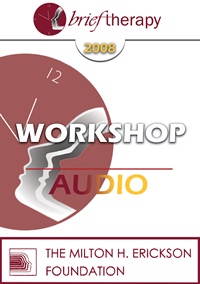
- Average Rating:
- Not yet rated
- Topic Areas:
- Workshops | Panic | Cognitive Behavior Therapy (CBT) | Anxiety
- Categories:
- Brief Therapy Conference | Brief Therapy Conference 2008
- Faculty:
- Reid Wilson, PhD
- Duration:
- 2:46:05
- Format:
- Audio Only
- Original Program Date:
- Dec 11, 2008
- Short Description:
- This treatment method teaches clients to actively engage with symptoms through interoceptive exposure, like hyperventilating or breathing through a straw. Emphasis is placed on reducing safety behaviors, using self-talk, point systems, and repeated practice to build resilience and shift fear responses.
- Price:
- $15.00 - Base Price
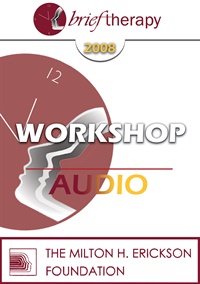
- Average Rating:
- Not yet rated
- Topic Areas:
- Workshops | Obsessive Compulsive Disorder (OCD) | Homework | Anxiety | Children and Adolescent Therapy
- Categories:
- Brief Therapy Conference | Brief Therapy Conference 2008
- Faculty:
- Reid Wilson, PhD
- Duration:
- 2:25:47
- Format:
- Audio Only
- Original Program Date:
- Dec 12, 2008
- Short Description:
- Reid Wilson presents a strategic approach to treating OCD using persuasive therapy and exposure techniques. He outlines key assignments like postponing, slowing down, modifying, and adding consequences to rituals. Techniques include daily worry time, loop tapes, and changing how obsessions are expressed. With practical examples and case studies, Wilson shows how consistent practice and mindset shifts can reduce compulsions and improve self-management.
- Price:
- $15.00 - Base Price
- Average Rating:
- Not yet rated
- Topic Areas:
- Clinical Demonstrations | Brief Therapy | Worry | Anxiety
- Categories:
- Brief Therapy Conference | Brief Therapy Conference 2010
- Faculty:
- Reid Wilson, PhD
- Course Levels:
- Master Degree or Higher in Health-Related Field
- Duration:
- 56:04
- Format:
- Audio and Video
- Original Program Date:
- Dec 11, 2010
- Short Description:
- In this live demonstration, a client works through chronic worry related to money, health, family, and career. Reid Wilson introduces the idea of separating "signal" worries that require action from "noise" that does not. Through self-talk and reflection, the client uncovers how insecurity and avoidance fuel their anxiety. The session offers practical tools for reducing worry, building awareness, and reclaiming energy for meaningful activities.
- Price:
-
Sale is $29.00
price reduced from Base Price - $59.00
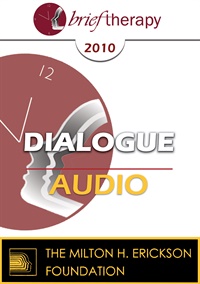
- Average Rating:
- Not yet rated
- Topic Areas:
- Anxiety | Dialogues | Children and Adolescent Therapy | Parenting
- Categories:
- Brief Therapy Conference | Brief Therapy Conference 2010
- Faculty:
- Lynn Lyons, LICSW | Reid Wilson, PhD
- Duration:
- 1:01:54
- Format:
- Audio Only
- Original Program Date:
- Dec 11, 2010
- Short Description:
- Wilson and Lyons share practical, family-centered strategies for treating anxiety in children. Working with kids as young as six, they emphasize playful techniques, active parental involvement, and the importance of shifting family routines. With 65% of anxious children having anxious parents, both stress the need for parents to learn and model anxiety management. Short-term motivators like candy are used alongside long-term mindset changes to build resilience in young clients.
- Price:
- $15.00 - Base Price
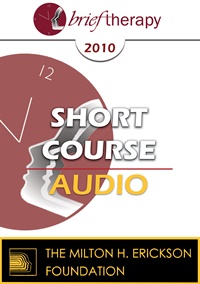
- Average Rating:
- Not yet rated
- Topic Areas:
- Anxiety | Short Courses | Brief Therapy | Ericksonian Hypnosis and Therapy Techniques
- Categories:
- Brief Therapy Conference | Brief Therapy Conference 2010
- Faculty:
- Joseph Dowling, MS, LPC
- Duration:
- 1:27:41
- Format:
- Audio Only
- Original Program Date:
- Dec 09, 2010
- Short Description:
- Milton H. Erickson, MD, understood that “the conscious (thinking) mind doesn’t do much of anything of much significance…while the unconscious mind is an infinite storehouse of dreams, potentials, and solutions…” This workshop will teach a brief, solution focused, strategic, and hypnotic approach to anxiety related disorders. Intellectualizing, analyzing, self-criticizing, WHY-ing and WHAT-IF-ing clients will be targeted as participants learn to employ Ericksonian interventions including solution-focused questions, strategic task assignments, and formal/conversational hypnosis via live demonstration, experiential exercise, and case studies.
- Price:
- $15.00 - Base Price
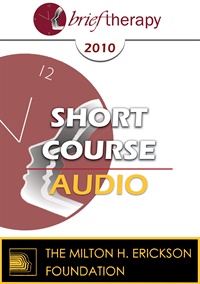
- Average Rating:
- Not yet rated
- Topic Areas:
- Short Courses | Anxiety | Depression | Therapist Development | Trauma | Brief Therapy
- Categories:
- Brief Therapy Conference | Brief Therapy Conference 2010
- Faculty:
- Virgil Hayes, DO
- Duration:
- 1:25:54
- Format:
- Audio Only
- Original Program Date:
- Dec 09, 2010
- Short Description:
- This workshop is a pragmatic look at how to gently, but quickly, understand how anxiety, depression and psychological trauma are created. Understanding the creation leads to co-creation to avenues of intervention. The emphasis is on non-medical, nonpathological understanding of problem creation. Case studies demonstrate the process from problem identification, conceptualizing leading to intervention and problem solving.
- Price:
- $15.00 - Base Price
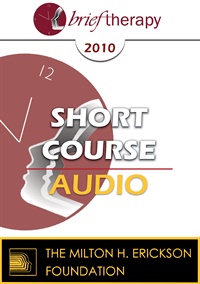
- Average Rating:
- Not yet rated
- Topic Areas:
- Anxiety | Children and Adolescent Therapy | Short Courses | Brief Therapy
- Categories:
- Brief Therapy Conference | Brief Therapy Conference 2010
- Faculty:
- Carme Timoneda-Gallart
- Duration:
- 1:16:36
- Format:
- Audio Only
- Original Program Date:
- Dec 09, 2010
- Short Description:
- This workshop will present some practical cases in order to illustrate the brief therapy process applied to children affected by emotional disorders as anxiety, headaches, loyalty conflicts and learning emotional blockages. In all cases, Ericksonian techniques such as metaphors and symptom prescription have shown very positive and efficient results. With Carme Timoneda-Gallart.
- Price:
- $15.00 - Base Price
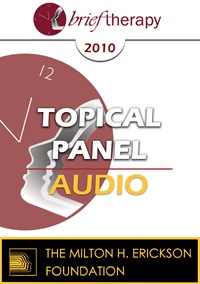
- Average Rating:
- Not yet rated
- Topic Areas:
- Anxiety | Topical Panels | Brief Therapy
- Categories:
- Brief Therapy Conference | Brief Therapy Conference 2010
- Faculty:
- Frank Dattilio, PhD, ABPP | Lynn Lyons, LICSW | Reid Wilson, PhD
- Duration:
- 58:23
- Format:
- Audio Only
- Original Program Date:
- Dec 11, 2010
- Short Description:
- A practical look at personalized therapy for anxiety, this panel covers strategies across age groups and clinical settings. Topics include managing anxiety in medically complex patients, preventive therapy for children with a focus on parent involvement, and using bold, exposure-based techniques to build resilience. The panel also tackles real-world challenges like tapering off benzodiazepines and addressing attachment issues. Emphasis is placed on tailoring treatment to the individual and harnessing external motivation to support lasting change.
- Price:
- $15.00 - Base Price
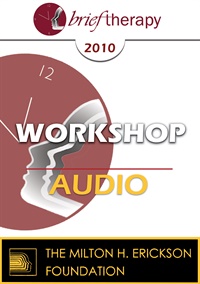
- Average Rating:
- Not yet rated
- Topic Areas:
- Worry | Workshops | Anxiety | Strategic Therapy
- Categories:
- Brief Therapy Conference | Brief Therapy Conference 2010
- Faculty:
- Reid Wilson, PhD
- Duration:
- 2:40:52
- Format:
- Audio Only
- Original Program Date:
- Dec 09, 2010
- Short Description:
- Strategic tools for managing worry and generalized anxiety, focusing on shifting from content to process. Techniques include cognitive restructuring, articulatory suppression, behavioral experiments, and identifying signal vs. noise. The session covers methods like worry-free zones, deep muscle relaxation, and disputing distorted thoughts to build lasting coping habits. Free downloadable resources and tools are offered to support both clinicians and clients, including those without access to treatment.
- Price:
- $15.00 - Base Price
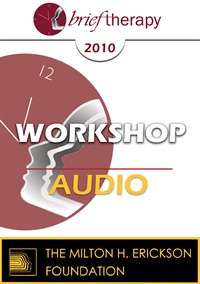
- Average Rating:
- Not yet rated
- Topic Areas:
- Anxiety | Workshops | Brief Therapy
- Categories:
- Brief Therapy Conference | Brief Therapy Conference 2010
- Faculty:
- Steve Andreas, MA, NLP
- Duration:
- 2:05:27
- Format:
- Audio Only
- Original Program Date:
- Dec 09, 2010
- Short Description:
- This extended workshop demonstrates how very brief interventions can quickly soften anxiety and other intense emotional states. Through live demonstrations and audience interaction, it shows how working with internal images, self-talk, tempo, and sensory experience can interrupt spirals of fear, reduce emotional intensity, and restore a sense of agency, often within minutes.
- Price:
- $15.00 - Base Price
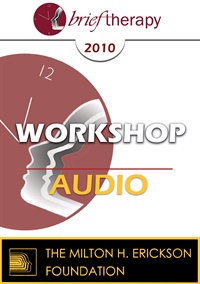
- Average Rating:
- Not yet rated
- Topic Areas:
- Anxiety | Workshops | Cognitive Behavior Therapy (CBT) | Obsessive Compulsive Disorder (OCD) | Panic
- Categories:
- Brief Therapy Conference | Brief Therapy Conference 2010
- Faculty:
- Reid Wilson, PhD
- Duration:
- 2:25:44
- Format:
- Audio Only
- Original Program Date:
- Dec 10, 2010
- Short Description:
- Wilson presents a strategic approach to treating anxiety disorders including panic, social anxiety, phobias, and OCD. Moving beyond traditional CBT, he introduces provocative techniques that reframe fear, welcome uncertainty, and promote active exposure. Through paradox, cognitive shifts, and interoceptive exercises, clients are guided to face anxiety head-on. Case studies and practical tools, like scoring exposure points and turning practice into a game, illustrate how frequent, intense exposure leads to lasting change.
- Price:
- $15.00 - Base Price


